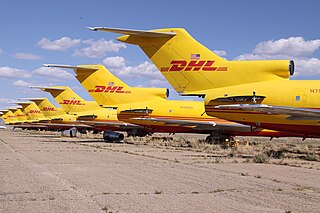The 2021 South Korean delivery workers strikes are a series of labour strike by delivery workers in South Korea in 2021.
The delivery industry experienced a significant surge during the COVID-19 pandemic in South Korea, with a 21% increase in the number of parcels delivered in 2020 compared to 2019. However, the 40 000 people who work as deliver couriers in South Korea face significant issues, including low pay, poor working conditions, and extremely long working hours. [1] [2] Many delivery workers are forced to work up to 14 hours a day. [3] In 2020, at least 19 delivery workers were documented to have died due to overwork. [4] In August of that year, the South Korean Ministry of Labour issued a statement calling for logistics companies to ensure couriers got enough rest. [5]
On 15 January, the Parcel Delivery Workers' Solidarity Union announced that it would hold a vote on a strike, saying that "even after logistics firms announced measures to prevent deaths from overwork (in October), one worker died and four others fainted due to overwork." [6] On 20 January, 91% of the workers voted in favour of striking, on a 97% turnout. The strike would be of indefinite length and was predicted to cause significant disruptions to deliveries around Lunar New Year. [7]
On 21 January, the union and logistic companies announced that a deal had been reached, under meditation from the Ministry of Land, Infrastructure and Transport. [8] The agreement would limit working hours to a maximum of 60 hours a week and 12 hours a day, along with limiting deliveries after 21h in the evening. The agreement would also see logistic companies create systems for sorting parcels instead of relying on delivery workers to both sort and deliver parcels. [9]
However, immediately following the agreement, doubts were raised about the implementation of the deal, with delivery workers at several locations through the country reporting that the companies were not implementing it. In response, the union announced that it would be re-launching the strike. [10] On 29 January, the strike was called off after the companies agreed to sign a legally binding deal, including government inspections teams to ensure that the companies followed the terms. [11]
On 4 February, further controversy over the implementation of the deal was sparked after the Association of Delivery Contractors issued a complaint saying that they had not been included in the negotiations and had not received any details concerning companies' plans to address the sorting issue. [12]
In April, a conflict occurred between delivery workers and a residential complex in Gangdong District, eastern Seoul, after the complex banned workers from parking inside the complex but residents still demanded that workers make deliveries direct to their doors. [13] On 2 May, a delivery workers union representing 5500 workers affiliated with the KCTU announced that it would be holding a vote on whether to strike in protest against gapjil, an arrogant and authoritarian attitude or actions of people who have positions of power over others. [14] On 7 May, 77% of the workers voted in favour of striking, with strike action due to begin on 11 May. [15]
In June, delivery workers affiliated with the Parcel Delivery Workers’ Solidarity Union walked off the job at several companies, including CJ Logistics, Lotte Global Logistics, Hanjin Transportation, and Logen. [16] The union accused logistic companies of failing to implement the January agreement on working conditions, with an internal survey showing that 85% of delivery workers still had to both sort parcels without compensation before delivering them. [17] At companies where workers did not have the right to strike, the workers chose to begin work two hours late in protest. The strike involved around 10% of delivery workers in the country. [18] A rally held by the workers in Seoul was dispersed by police. [19] On 17 June, a new agreement was reached, where the companies once again agreed to limit working hours to 60 hours a week and pledged to hire workers to sort parcels by September. [20]
On 20 October, a number of delivery workers took part in the general strike called by the KCTU. [21]

The United States Postal Service (USPS), also known as the Post Office, U.S. Mail, or Postal Service, is an independent agency of the executive branch of the United States federal government responsible for providing postal service in the U.S., its insular areas, and its associated states. It is one of the few government agencies explicitly authorized by the Constitution of the United States. As of 2023, the USPS has 525,469 career employees and 114,623 non-career employees.

United Parcel Service, Inc. (UPS) is an American multinational shipping & receiving and supply chain management company founded in 1907. Originally known as the American Messenger Company specializing in telegraphs, UPS has grown to become a Fortune 500 company and one of the world's largest shipping couriers. UPS today is primarily known for its ground shipping services as well as the UPS Store, a retail chain which assists UPS shipments and provides tools for small businesses. UPS offers air shipping on an overnight or two-day basis and delivers to post office boxes through UPS Mail Innovations and UPS SurePost, two services that pass on packages to the United States Postal Service for last-mile delivery.

The United Auto Workers (UAW), fully named International Union, United Automobile, Aerospace and Agricultural Implement Workers of America, is an American labor union that represents workers in the United States and southern Ontario, Canada. It was founded as part of the Congress of Industrial Organizations (CIO) in the 1930s and grew rapidly from 1936 to the 1950s. The union played a major role in the liberal wing of the Democratic Party under the leadership of Walter Reuther. It was known for gaining high wages and pensions for automotive manufacturing workers, but it was unable to unionize auto plants built by foreign-based car makers in the South after the 1970s, and it went into a steady decline in membership; reasons for this included increased automation, decreased use of labor, mismanagement, movements of manufacturing, and increased globalization.

Royal Mail Group Limited, trading as Royal Mail, is a British postal service and courier company. It is owned by International Distributions Services. It operates the brands Royal Mail and Parcelforce Worldwide (parcels). The company used the name Consignia for a brief period in the early 2000s.

DHL is a German logistics company providing courier, package delivery and express mail service, delivering over 1.8 billion parcels per year. A subsidiary of the German logistics firm DHL Group, its express mail service DHL Express is one of the market leaders for parcel services in Europe and Germany's main courier and parcel service.

Australia Post, formally known as the Australian Postal Corporation, is a Commonwealth government-owned corporation that provides postal services throughout Australia. Australia Post's head office is located on Bourke Street, Melbourne, above the Bourke Street Post Office.

Geopost is an international parcel delivery service for sorter compatible parcels based in Issy les Moulineaux, France. Until 2015 DPD stood for Dynamic Parcel Distribution. Its brands are DPD, Colissimo, Chronopost, Seur and BRT. The company is based in France and operates mainly in the express road-based market.

La Poste is a postal service company in France, operating in Metropolitan France, the five French overseas departments and regions and the overseas collectivity of Saint Pierre and Miquelon. Under bilateral agreements, La Poste also has responsibility for mail services in Monaco through La Poste Monaco and in Andorra alongside the Spanish company Correos.
The 1988 United Kingdom postal workers strike was a strike in the United Kingdom in August and September 1988. It was the country's first national postal strike for 17 years, and began after postal workers at Royal Mail walked out in protest over bonuses being paid to recruit new workers in London and the South East. As a result, postal deliveries throughout the United Kingdom were disrupted for several weeks.

The 2009 Royal Mail industrial disputes is an industrial dispute in the United Kingdom involving Royal Mail and members of the Communication Workers Union (CWU), which began in the summer of 2009. It was the country's first industrial action involving postal workers since 2007 and came about after the Communication Workers Union accused Royal Mail of refusing to enter into dialogue regarding how the implementation of modernisation plans would affect the job security of postal workers.

General Logistics Systems B.V. (GLS) is a parcel services provider operating in Europe and North America.
Yodel is a delivery service company based in Liverpool, England. It was originally known as the Home Delivery Network, until it acquired the business-to-business (B2B) and retail (B2C) operations of DHL Express UK and thereafter, rebranded itself as Yodel in May 2010. Previously privately owned by the billionaire Frederick Barclay, it was acquired by rival Shift in February 2024.
OnTrac is a last-mile delivery company that services the continental United States. Founded in 1986 as LaserShip, the company is based in Vienna, Virginia and has sorting centers in 31 states.

Cart is a 2014 South Korean film directed by Boo Ji-young about employees of a retail supermarket who band together when the contract workers are laid off, it is both an ensemble drama and a social critique.

Nova Poshta is a private Ukrainian postal and courier company that provides logistics and related services for individuals and businesses. Its main competitor is the country's post office, Ukrposhta.

Coupang, Inc. is e-commerce company based in Seoul, South Korea and Seattle, WA and incorporated in Delaware, United States. Founded in 2010 by Bom Kim, the company expanded to become the largest online marketplace in South Korea. Its expansion led the company to video streaming distribution after the launch of Coupang Play service. Coupang is often referred to as the "Amazon of South Korea", due to its position and corporate size in the South Korean online market.
The 1949 New York City brewery strike was a labor strike involving approximately 7,000 brewery workers from New York City. The strike began on April 1 of that year after a labor contract between 7 local unions of the Brewery Workers Union and the Brewers Board of Trade expired without a replacement. The primary issue was over the number of workers on board delivery trucks, with the union wanting two workers per truck as opposed to the companies' standard one person per truck. Additional issues regarded higher wages and reduced working hours for the union members, among other minor issues.
The 2021 Heaven Hill strike was a labor strike involving about 420 workers for the Heaven Hill bourbon whiskey distillery in Bardstown, Kentucky, United States. These workers are members of the United Food and Commercial Workers Local 23D and were on strike since September 11. The labor dispute is over the terms of a new five-year labor contract between the union and the company, which is one of the largest bourbon producers in the world. In particular, union members were concerned about "gray areas" in the contract that they believed could lead to union employees working weekends and extra overtime without pay. Additional concerns from the union were over reduced take-home pay and a removal of the limit on premiums for health care insurance. On September 9, union members voted by about 96 percent to reject the proposed contract and authorized strike action. As a result, the union's existing contract expired without replacement on September 10 and striking commenced the following day.
Currently Microsoft workers in the United States do not have a current labor union. This is expected to change with the acquisition of Activision Blizzard, which already recognizes a union in one of its subsidiaries. Microsoft USA workers have been active in opposing military/law-enforcement contracts with their employer.

Starting in May 2022, postal workers in the United Kingdom undertook a series of strikes and industrial disputes. They principally involved members of Unite and the Communication Workers Union (CWU) at both Royal Mail and the Post Office. The Royal Mail strikes ended in July 2023 after workers agreed to a three-year pay deal with Royal Mail.